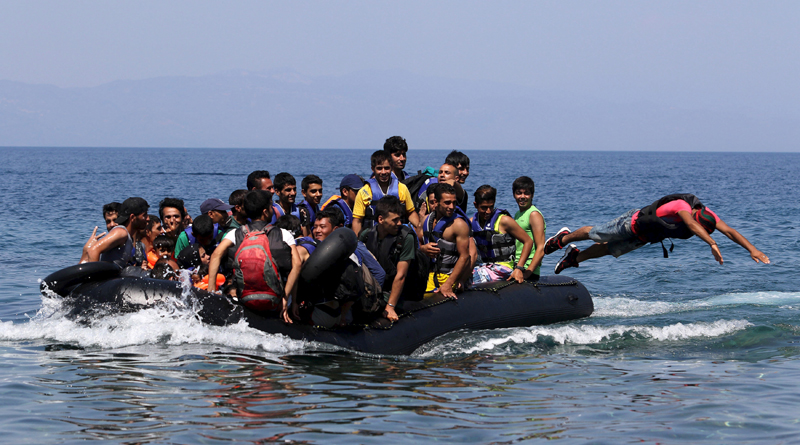Facing possible drowning to escape the horror of war, migrants are trying their luck in Greek waters; writes Ameera Fouad
With the plight of war and the hardships of living, more than 30,000 migrants have entered Greece this year. The migrants are of many nationalities, but the majority of them are Syrians and Iraqis trying to escape war with their lives and those of their families.
It is estimated that 2015 has witnessed the world’s largest wave of mass-migration since World War II. Migrants are arriving in Greece at record levels, outpacing Italy and surpassing the levels and 2014.
As the migrants are pouring into Greece, the country’s economy is about to collapse, with the European Central Bank withdrawing its support for Greek banks.
In between accepting migrants and facing an economic plight, Greece has threatened to unleash a wave of millions of migrants and potential jihadists on Europe unless the Eurozone backs down on austerity demands.
Crowds of migrants and refugees were building on Greece’s border with Macedonia on Saturday after a cold, wet night spent in the open, their entry slowly rationed by Macedonian police and soldiers.
Macedonia, which has declared a state of emergency, witnessed the largest wave of migration and sealed the frontier after more than 2,000 migrants were pouring over the borders on a daily basis.
Over 40,000 entered Macedonia in the past few months. Whereas some are allowed to go to the Gevgelija railway stations and sent to Serbia, the last stop en route to Hungary and Europe’s borderless Schengen Zone, millions of others are stationed in railway stations across the country’s borders.
They have warned that if the Eurozone left Greece to face its economic plight on its own, it would likely give all the migrants EU travel papers to cross borders into the Eurozone area.
“If they strike us, we will strike them,” said Mr. Kammenos, the leader of the right-wing Independent Greeks Party which is in coalition with Greece’s ruling far-left Syriza government. “We will give to migrants from everywhere the documents they need to travel in the Schengen area, so that the human wave could go straight to Berlin.”
The European Commission last week sought “assurances… that no measures to open up detention centres are being taken”.
It has been three weeks since Greece received the first tranche of its new bailout from the European Union. Despite elections calling for broader democratic and political reforms, and after the critical time through which Prime Minister Alexis Tsipras resigned, time was needed for the government to meet the terms of the bailout and persuade its creditors to consider giving Greece much needed debt relief.
The elections would likely create political maneuvers in Athens and further complications and slow the implementation of the 86 billion euro bailout programme, worth about $98 billion at Friday’s exchange rate, signed by Mr Tsipras in July.
An initial progress review by creditors, scheduled for October, may be delayed, which would delay discussions between Greece and its lenders over possible restructuring of the country’s crippling sovereign debt.


